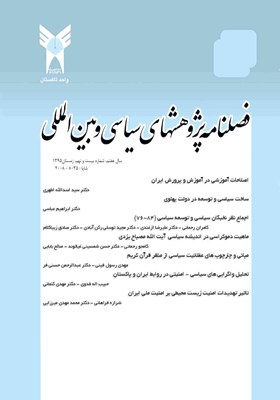اجماع نظر نخبگان سیاسی و توسعه سیاسی(84-76)
محورهای موضوعی : مجله پژوهش های سیاسی و بین المللی
کلید واژه: توسعه سیاسی, اصلاحات, نخبگان سیاسی, اجماع نظر, اصلاح طلبان,
چکیده مقاله :
کامران رحمانی - علیرضا ازغندی- مجید توسلی رکن آبادی- صادق زیبا کلام اگرچه توسعه سیاسی فرآیندی پیچیده ای است که از عوامل و فاکتورهای گوناگونی تاثیر می پذیرد ولی با توجه به شرایط خاص جامعه ایران و نقش رفتار و رویکردهای افراد توانمند در تحولات این کشور نقش نخبگان در روند توسعه سیاسی ایران برجسته گردیده است. به این ترتیب پرسش اصلی در این پژوهش این است که اجماع نظر نخبگان سیاسی حاکم چه نقش و اهمیتی در روند توسعه سیاسی ایران در سال های 84-76 داشته است. در نتیجه یافته های این پژوهش حاکی از این است که توسعه سیاسی به عنوان محور تفکر اصلاحات، علاوه بر چالش های ساختاری و قانونی حاکم(موانع بیرونی)، در درون خود جناح اصلاح طلب نیز، هرگز مفهوم و تعریفی سیستماتیک، مورد اجماع و عملیاتی نیافت و سازوکارها، مؤلف ها و شاخص های آن مشخص نشد و مسأله عدم اجماع نظر و تعارض همچنان به عنوان یک پدیده مستمر در فضای سیاسی کشور باقی ماند،گویی تعارض و منازعه بخشی از فرهنگ سیاسی حاکم در میان نخبگان سیاسی ایران می باشد.
Although the political development is a complicated process influenced by different factors. Considering the specific conditions of Iran society and the effects of behavior and approaches taken by capable people in the evolution and changes in this country the role played by the elites has been high lighted in the process of Iran political development. So the main question in this paper is that how the opinion agreement of governing political elites influenced he process of Iran political development during 76-1384 and how important it was.The research findings suggest that political development as the axis of reform thought. In addition to governing structural and legal challenges(external obstacles), even in reformist party itself never found a systematic agreed, and applicable concept and definition, its mechanism, components, and indices was not specific and the issue of opinion disagreement and conflict. Remained as a continuous process in country political environment, as if the conflict and discussion is a par of political culture governing among Iran political elites
_||_

